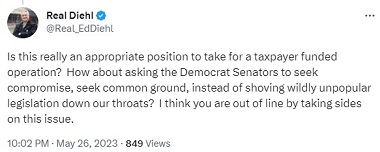
On this day, April 4, 2020, New York state got 1,000 ventilators after the Chinese government facilitated a donation from billionaires Jack Ma and Joseph Tsai, the co-founders of the Chinese e-commerce giant Alibaba. Gov. Andrew Cuomo said that the state of Oregon had volunteered to send 140 more breathing machines. New York had 113,700 confirmed cases as of this morning. At least 3,565 had died in New York and more than 115,000 had tested positive.
 Post an Event
Post an Event
| Coffee Klatch, Jeff Kropf host |
| Monday, April 7, 2025 at 6:00 pm |
Political news unraveled. Guest speakers, Senators and Representatives. Hear Candidates running for May Primary. Learn how to testify. Bring your friends and neighbors!
All welcome. |
| Bo & Vine 3969 Commercial SE, Salem |

| OFF 2-Day Shooting Event |
| Saturday, May 3, 2025 at 10:00 am |
| Oregon Firearms Federation. All proceeds benefits OFF’s legal fund to cover ongoing fight against Measure 114 and efforts to protect your Second Amendment rights. Cost $50 per day, May 3 and 4, 10am to 7pm. Competitions. Special prices. Food & drink provided. 541-258-4440 |
| Indoor Shooting Range, 580 S Main, Lebanon, OR |

| Oregon Citizens Lobby War Room |
| Thursday, June 26, 2025 at 8:30 am |
| Meet at Ike Box for training and updates on legislation. Send testimony, watch hearings, and visit capitol to testify. Legislators and special guests. Every Thursday 8:30am to 3:00pm to June 26. |
| Ike Box, 299 Cottage St NE, Salem (upstairs) |
Government is not a parent
The Washington Examiner published in their Restoring America column, an
article by Senators Daniel Bonham and Kim Thatcher titled “Why we’re denying quorum in Oregon’s Senate.â€
In the article they state, “Our motivation is simple: We are protesting the lawlessness and corruption of the Democrats who have controlled our state for decades. This is the only tool we have left to stand up and defend Oregonians…Without the first walkout in Oregon’s history in 1897, we may not have the initiative and referendum process we do today — one of the most direct and democratic aspects of our state Constitution.â€
They contend that Measure 113 was passed to scare them away from denying quorum, but it has backfired. “We work for Oregonians, not the government…Our decision to deny quorum now is the result of two immoral bills pushed by Democrats.†Both bills are an attack on the family removing parents’ rights.
House Bill 2395, would create government-sanctioned secrecy between parents and their children, thereby driving a wedge between the family unit by removing parental consent for children to have substance abuse treatment and mental health services, when parents should be informed of all medical and health services their children need.
House Bill 2002, would allow a child of any age to be able to have an abortion without parental knowledge, and change Oregon's current abortion laws to remove any requirement for healthcare providers to notify parents if a minor has an abortion. It would also allow minors to have irreversible sex-change treatments and procedures without their parent’s knowledge.
“Democrats in power are willing to put the full force of government behind this controversial concept, prioritizing their special interests over the well-being of Oregon families,†Bonham and Thatcher stated.
They want to make Oregon a “transgender tourism†state, adding to already being an “abortion tourism†state. House Bill 2002 would give protections to doctors who perform sex-change surgeries in other states, in violation of their state laws, and allows them to “seek refuge†here so they will not lose their medical license, even though they may have lost it in another state. Oregonians and insurance companies will be paying for this.
A D V E R T I S E M E N T

A D V E R T I S E M E N T
House Bill 2002 comes with a $6.2 million price tag, but that doesn’t include the cost the insurance companies will pass along in increased premiums. Insurers will have to cover expenses for transition surgeries and years of treatment will have an astronomical impact on health premiums. Actuaries also factor in increased mental disorders and gender dysphoria as well as increased cases of depression and managed care.
The article states, “Democrats claim this is an expansion of Oregonians’ “rights,†but what it would really do is open up young girls and women to additional harm. Whoever gets an underage girl pregnant needs to be in jail. Instead, these criminals would be able to coach young women and girls about how to get an abortion, destroying the evidence of wrongdoing.â€
HB 2002 repeals the protections in ORS 167.820 - concealing the birth of an infant. It would no longer be a crime to conceal the birth of an infant or to prevent a determination of whether it was born dead or alive. This allows for live abortions, abortions after birth, or for a newborn to be bought and sold.

Senator Bonham writes in his newsletter, “As soon as the government steps in, insidious opportunities for pedophiles, sex traffickers, and kidnappers crop up… Parents are financially, legally, and morally responsible for their children. This should be an inalienable understanding about the relationship between parent and child. I find it extraordinarily disturbing that the majority party seeks to protect their activist agenda at the expense of children's lives. The government is not a parent; it never has been and never will be.â€
--Donna Bleiler| Post Date: 2023-06-02 13:23:02 | Last Update: 2023-06-01 23:53:52 |
The lawsuit pits disabled persons against homeless persons
The City of Portland has settled a federal lawsuit with several persons claiming that "Federal disability access laws were enacted to provide persons with disabilities an equal opportunity to participate fully in civic life." According to the
complaint filed in federal court, the lawsuit was brought "to address the City’s systemic failure to provide full and equal access to its sidewalks to Plaintiffs and similarly situated persons with mobility disabilities."
The
complaint cites the Americans with Disabilities Act of 1990 and the Rehabilitation Act of 1973. The first named plaintiff, whence the suit gets it's name is Tiana Tozer who -- according to court documents -- "lives in the Irvington neighborhood of Portland, Oregon and works in Downtown Portland. Ms. Tozer has a mobility disability that limits her ability to walk."
The lawsuit pits disabled persons against homeless persons. Simply put, "The City has failed and continues to fail to maintain its sidewalks clear of debris and tent encampments, which is necessary to make its sidewalks readily accessible to people with mobility disabilities. Indeed, a substantial number of the City’s sidewalks—particularly those in the City’s busiest business corridors—do not comply with applicable federal statutes and regulations because they are blocked by tent encampments and attendant debris, rendering the sidewalks inaccessible, dangerous, and unsanitary for people with mobility disabilities."
The complaint offers some detail about some of the worst locations. "Simply, the City’s sidewalks, when viewed in their entirety, are not readily accessible to and usable by persons with mobility disabilities due to the City’s failure to maintain clear sidewalks free of debris and tent encampments. Indeed, the City’s most glaring violations are centered in Portland’s Old Town, Chinatown, Downtown, and Pearl District areas, as well as locations on the City’s east side, including the Central Eastside Industrial District, the Lloyd District, and the areas surrounding Laurelhurst Park, Lone Fir Cemetery, and Sunnyside Elementary School.
According to the
settlement agreement, the city will:
- Implement the following reporting programs to ensure that community members with Mobility Disabilities can promptly and efficiently report obstructions to the Sidewalk caused
by any Campsite(s).
- Not distribute tents or tarps during the Term of the Agreement, with limited exceptions.
- Within five business days following a report of a Sidewalk obstructed by a Campsite, a City employee or contractor shall visit the identified Campsite.2 At that time, the City employee or contractor will identify whether the identified Campsite is obstructing all or any portion of the Sidewalk and will indicate the results of that assessment in the City’s database.
- Ensure that contractors employed by the City (Rapid Response, outreach workers, or other hired contractors) will instruct those who are displaced by Campsite removals that they cannot relocate on any Sidewalk.
- Provide a public facing website that includes search functionality to access data including the specific dates and locations of Campsite removals.
- Install signs, in substantially the form set forth in Exhibit B, informing people that they are not allowed to place obstructions in the Sidewalk on a City block when certain conditions are met
The Portland City Council
enacted an emergency ordinance to approve the settlement.
--Staff Reports| Post Date: 2023-06-01 22:38:37 | Last Update: 2023-06-01 23:19:55 |
Republican Senators threatened with $325 per day fine
Virtually every day articles are release decrying what the Senate Republicans are doing to government by staying out of the capitol. Here is one week's sampling of their desperate attempts to sway public opinion to ignore the real issue. All can be read
here.
- As Oregonians Face Historic Drought, Go Without Clean Drinking Water, Unconstitutional Walkout Stalls Urgent Solutions; Central and Eastern Oregon communities hit the hardest by these crises.
- Democrats Stand for Oregon Veterans and Their Families; Bills to honor fallen veterans and ensure their remains receive proper burial delayed by the unconstitutional Republican walkout.
- Oregon Legislature Announces More Than $4 Billion Public Safety and Accountability Budget Framework for A Safer Oregon; The 2023-2025 Public Safety and Accountability Budget framework would invest in our crisis response networks to support and protect Oregon families…If Senate Republicans don’t decide to come back to work, we can’t vote on our budget. If we can’t pass our budget, Oregon families, including Senate Republicans’ constituents, will be the ones that pay the cost of their political games.
- Safer Oregon Agenda Threatened as Senate Republicans Refuse to Do Their Jobs; Bills that would address the state's fentanyl crisis and save lives at risk as Senate Republicans ignore Oregon voters.
- Senate President Demands Republicans Return to Work; Most Senate Republicans Have Not Shown Up to Work for Four Weeks.
- DO YOUR JOB: Unconstitutional Walkout Undermines Government Transparency
- Senate Republican Government Shutdown Blocks Legislation Removing Toxins from Children’s Products; Oregon falls behind other states in toxins regulations.
On the opposite side, the Oregon Republican Senators have one response:
- Senate President Rob Wagner’s Unlawful, Uncompromising, Unconstitutional Actions. “The 2023 session has been punctuated with the most hyper partisan chicanery. Here is a list of how Senate Rules, statutes, and the Constitution have been purposefully violated and ignored by Senate President Rob Wagner.â€
- Republicans Seek a Bipartisan End to Session, Democrats Seek a Return to Unlawful Bills, Extreme Partisanship
- President Wagner Intends to Impose $325 Fine Each Day Senators Exercise Their Constitutional Right to Protest
A D V E R T I S E M E N T

A D V E R T I S E M E N T
Senate President Rob Wagner announced on the Senate Floor today that he would compel the attendance of absent members and impose a fine of $325 per day beginning Monday June 5th, 2023.
Senate Republican Leader Tim Knopp (R-Bend) released the following
statement: “One thing remains clear: President Wagner is insistent on facilitating an unlawful, uncompromising, unconstitutional agenda. Once again, he has retaliated against members who are exercising their right to peacefully protest his own unlawful, hyperpartisan actions.â€
“Senate Republicans don’t feel compelled to entertain his political theater. In fact, we suggest President Wagner pay our fines since it is his behavior that galvanized our protest. “
“If Democrats want us to provide a quorum before June 25th, they must agree to follow Senate Rules, follow the law, and work to put forward constitutional, bipartisan bills that don’t violate a parents’ sacred right to love and care for their child. Senate Republicans will not be bullied into allowing the lawlessness to continue.â€
--Donna Bleiler| Post Date: 2023-06-01 16:49:53 | Last Update: 2023-06-01 23:26:20 |
Republicans will not abandon parents rights
Oregon Governor Tina Kotek attempted to insert herself into discussions on the pause in the Oregon Senate but didn’t come prepared to make good on her commitment to serve Oregonians – all Oregonians, Senate Republican Leader Tim Knopp (R-Bend) said.
Democrat leaders blast Republicans for not showing up to pass their agenda. Representative Daniel Nguyen (D-Lake Oswego, SW Portland) said, “When Senate Republicans refuse to respect our democracy and take a vote on critical legislation, Oregonians – many who have small businesses – are the ones who pay the price.â€
There is a growing development that this session could be the least expensive for small businesses there has been in many years. One small business owner commented to Northwest Observer that he still has not recovered from the lock down, and he has never seen a session that ends with taxpayers and small businesses better off.
A D V E R T I S E M E N T

A D V E R T I S E M E N T
Senator Knopp stated, “Republicans entered good-faith discussions with the Governor over the last several days. Our goal was to find a bipartisan resolution for the end of Session resulting in the passage of substantially bipartisan budgets and bills. Unfortunately, the Governor was focused on a return to the status quo: an agenda that is unlawful, uncompromising, and unconstitutional.â€
Perhaps the Governor is concerned with the number of bills that will be found unlawful that were pushed through by the majority party without a single Republican vote. Senator Suzanne Weber (R-Tillamook) and rural legislators filed legal action against the Senate President and Secretary that is in Circuit Court now. Rural Senators have filed numerous constitutional and statutory complaints against the President and Secretary since January 2023.
The Governor may be facing another resignation as accusations are mounting against Senate President Wagner. He is accused of denying medical absences for Republican Senators while excusing the same for Democrats. Others were refused religious accommodation that has been granted for over 160 years, and still others were excused. Further complaints include refusal to adjust and meet Oregon Constitution and statutes regarding plain language requirements. Even the Legislative Counsel has opinioned that this type of complaint must be investigated.
“If Democrats want us to provide a quorum before June 25th,†Knopp said, “they must agree to follow Senate Rules, follow the law, and work to put forward constitutional, bipartisan bills that don’t violate a parents’ sacred right to love and care for their child. In the meantime, we will continue to work every day on behalf of the Oregonians we took an oath to represent.â€
--Donna Bleiler| Post Date: 2023-06-01 10:46:45 | Last Update: 2023-06-01 02:17:08 |
Priority safety bills differ on what it will take
Oregon Democrat legislative leaders announce more than $4 billion for the Public Safety and Accountability Budget framework for their Safer Oregon Agenda. If approved, the package would support core law enforcement agencies and make targeted investments in keeping Oregon families safe and addressing serious crime, including:
- $813 million to fully fund the Oregon Department of Justice to ensure the agency has the personnel and resources needed to be successful in their work in human trafficking intervention, violence prevention and victim services.
- $611 million for the Oregon State Police for crisis response system.
- $2.2 billion for the Department of Corrections.
- $750 million for the Oregon Judicial Department.
- $83 million for the Department of Public Safety and Safety Standards and Training to address the law enforcement workforce shortage.
- $73.9 million for Oregon Department of the State Fire Marshal.
The Legislature will also be directing significant resources to the Oregon Public Defense System to ensure a fair legal system, and investing in behavioral health crisis response services through omnibus legislation like House Bill 2395, which would address the fentanyl crisis in a targeted and strategic manner to reduce drug trafficking.
This Safer Oregon Agenda includes 13 bills with additional funding requests for coordination between the state and local law enforcement to address retail theft rings of an unspecified amount, funding $6 million for Children’s Advocacy Centers to prevent sexual abuse, and $10 million funding for the Oregon Domestic and Sexual Violence Services Fund.
At the opening of the session, the Oregon House Republican Caucus announced their
2023 priorities. One of four priorities was Supporting Law Enforcement and Increasing Community Safety. That package included:
- Reform Measure 110.
- Fight illegal grow operations and address the fentanyl crisis.
- Stand up for Oregonian’s second amendment rights.
- Increase law enforcement presence on our streets.
- Support law enforcement recruitment and training programs.
Then in March the House Republican Caucus proposed the
Safe Schools Package offering seven bills with two having bipartisan support. They proposed common sense safe guards for schools and a study related to hiring retired police officer to provide security in schools. That was followed in April with a
Safe Communities Package, which laid out 16 Senate bills that had very little cost.
Early March Senate Republicans offered three bills requested by victims that would collectively support victims of sex crimes and promote justice after Richard Gillmore, a serial rapist of at least 9 victims was released from prison. “We have three bills that we think are critically important in keeping Oregonians safe and keeping violent perpetrators in prison,†said Senator Knopp.
A D V E R T I S E M E N T

A D V E R T I S E M E N T
Very few of the Republican bills received a hearing. Now “safety†is being formulated on Democrat terms to create public interest. A new bill in the package is
HB 3443, which prohibits landlords from terminating lease or taking other specified actions due to status of tenant as victim of bias crime. Senate committees continue to pass bills without Republican representation staking up bills for a floor vote. They also made sure to include the controversial firearms bills, HB 2572 and HB 2005. A list of the bills can be viewed
here.
“The people of Oregon were loud and clear that making our streets and communities safer must be one of our top priorities this session,†said Senator Floyd Prozanski (D-Springfield & Eugene). “With this package, we are taking direct aim at the root causes of crime and improving law enforcement response to ensure every Oregonian feels safe and secure wherever they live in our state.â€
Senate Republican Leader Tim Knopp (R-Bend) agreed with the priority, but differs on how to resolve Oregon’s unsafe environment.
--Donna Bleiler| Post Date: 2023-05-31 12:09:36 | Last Update: 2023-06-01 15:22:57 |
Nonprofits are prohibited from any political campaigning
The Oregon Food Bank
tweeted something at 5:00 PM on May 26, 2023 that is turning some heads.
"Senators who walk off the job are walking away from their responsibility to the million+ Oregonians who will seek food assistance this year. Tell our legislators to do what’s right and come back to work on behalf of people facing hunger in Oregon." declared the tweet.
The tweet and
other messaging sent from OFB were referring to a bill that they are urging a vote on that is currently stuck in the legislature due to the Oregon Senate Republicans walking out in protest of controversial legislation being pushed by the Democrats.

Republican Representive Ed Diehl (HD-17)
tweeted in response,
"Is this really an appropriate position to take for a taxpayer funded operation? How about asking the Democrat Senators to seek compromise, seek common ground, instead of shoving wildly unpopular legislation down our throats? I think you are out of line by taking sides on this issue."
Nonprofit entities are prohibited from any political campaigning,
according to the IRS. Many observers are wondering if some Oregon nonprofits are disobeying the law.
Non profits such as The
Oregon Food Bank are also required to
provide transparency of their operations to the public.
These days, in the age of information, this information is
easily accessible online. Susannah Morgan is the CEO of OFB and makes $199,231 a year. There are six other paid directors of OFB that make six-figure salaries.
They spent $9,482 in one year in lobbying expenses, which doesn't seem to include $112K salary to Moira Bowman, director of advocacy.

The Department of Justice, Charitable Activities
regulates charitable activities in Oregon, including nonprofit corporations organized for a public benefit.
--Ben Fisher| Post Date: 2023-05-31 07:43:03 | Last Update: 2023-05-31 10:42:53 |
Linn, Marion counties want state mental hospital rules changes
Linn County Oregon
has announced that they are joining with Marion County in asking for changes in how long criminal defendants can be held at the Oregon State Mental Hospital. Commissioners Roger Nyquist, Sherrie Sprenger and Will Tucker have all agreed.
In September 2022, a federal judge ruled that criminal defendants could not be housed at the hospital for more than one year. The decision also means anyone charged with a misdemeanor cannot be housed at the state hospital and those services must be provided at the county level.
According to a letter to Gov. Kotek and David Baden interim director of the Oregon Health Authority, Marion County Commissioners Colm Willis, Kevin Cameron and Danielle Bethell contend that decision, “essentially ended all civil commitments to the state hospital and has left more individuals with untreated behavioral health needs requiring a hospital level of care in our communities.â€
Commissioner Nyquist said the state is failing to adequately operate a state mental hospital that meets the statewide needs. He added the mental health issues are a key factor in why many people are homeless. He said the state must add capacity to meet those needs.
A D V E R T I S E M E N T

A D V E R T I S E M E N T
Commissioner Sprenger, who previously served as a state representative, said reducing the number of beds at the state hospital has been a legislative policy statement for several years.
Marion County and now Linn County, are asking:
- That if someone is a risk to the community, they be admitted to the state hospital.
- That the state craft a long-term plan to provide secure in-patient services to meet the anticipated need for the next 20 years.
- The state be required to modify its expedited admissions policy so that more individuals can be admitted through the civil commitment process.
- The state be required to retain liability for individuals on community restoration, if under state law, they would have been released from the state hospital.
- There be a limit the amount of time an individual can remain in community restoration.
- There be a “safety valve†to allow for longer stays at the state hospital if a trial court finds that person presents significant public safety issues.
- That the state accept individuals charged with misdemeanor crimes.
--Ben Fisher| Post Date: 2023-05-30 19:06:12 | Last Update: 2023-05-30 19:20:31 |
“This is not good faith bipartisanshipâ€
The Oregon State Senate Republican Caucus
have released a memo declaring
Senate President Rob Wagner’s recent actions in the state capitol as unlawful, uncompromising, and unconstitutional.
Actions they are saying began long before the constitutional walkout protest.
“Democratic majority rule is constrained by laws and the provisions of our Constitution.
When the majority breaks these laws and willingly chooses to ignore them, they are in
violation of their sacred oath of office and trampling on the very mechanisms that
maintain a healthy representative democracy. It is our duty to protect these mechanisms
of the law and vigorously hold them accountable. Rob Wagner is driving representative
democracy off a cliff. We will not merely be a speed bump to these reckless and partisan
violations of our laws,†said Senate Republican Leader Tim Knopp (R-Bend)."
The Senate Republican have pointed out some highlights:
Eliminating Public Hearing:
Rob Wagner has allowed an extremely partisan bill,
SB 393, to pass out of committee without a public hearing. There is no greater example of
driving democracy into a ditch by allowing bills to pass without holding a public
hearing.
A D V E R T I S E M E N T

A D V E R T I S E M E N T
Silencing Oregonians that are represented by Republicans:
Rob Wagner killed the entire Senate
Republican Equitable Oregon agenda. He did this despite Republicans and
Independents representing nearly 2 million Oregonians and roughly 90% of Oregon’s
natural resource lands. Later, Republicans attempted to bring 75 bills to the floor for
consideration and Rob Wagner led his Caucus in voting no on each of these critical
discussions. This is not good faith bipartisanship.
Refusing Common Sense Bipartisanship:
Rob Wagner refuses Republican and
Independent legislators requests to set up a bipartisan, bicameral, even-numbered
committee on oversight and accountability.
--Ben Fisher| Post Date: 2023-05-30 16:38:32 | Last Update: 2023-05-30 16:53:12 |
Oregonians want election integrity
Oregon House passed
House Bill 2004 with bipartisan support, which would establish a plan for implementing ranked choice voting (RVC) in Oregon, for voter
consideration.
RCV requires voters to rank candidates by preference instead of voting for just one person. A candidate wins by receiving a majority of the first-preference votes cast. When there is no majority winner, this method allows for an instant runoff. The candidate with the lowest number of first-preference votes is eliminated and their vote is transferred to their second preference candidate. This process continues until a candidate achieves a majority of the votes cast.
Supporters claim if approved, this legislation would:
- Allow voters to rank their candidates in order of preference by establishing ranked choice voting elections for statewide and federal offices, for both primary and general elections with three or more candidates, beginning in 2028.
- Provide guidance for cities and counties to use ranked choice voting elections if they choose to implement locally
- Create a process for county clerks to participate directly in the implementation to ensure effective and standardized implementation across Oregon
- Pave the way for an effective, multilingual, and culturally responsive statewide voter education campaign to ensure all voters across the state understand and are comfortable with ranked choice voting ballots.
Opponents are questioning:
- What is the impact on the American Republic system.
- It ends “one-person, one-vote†principle by the “instant runoff†that allows some ballots to be counted for multiple candidates. On the opposite side, once all candidates are eliminated on a ballot, that voter no longer has a vote.
- The RCV ballot confusion has resulted in more ballot errors and more ballots rejected.
- Too many candidates distorts the method and may not reflect voters’ choice. RCV claims to protect majority rule, but in reality, it creates an artificial majority by eliminating the votes of the lowest-ranking candidates. A Maine study found that of 98 recent RCV elections, 60 percent of RCV victors did not win by a majority of the total votes cast.
- The cost of new equipment, the cost of an education campaign, and cost of training for county clerks.
- If the current election computer system is hackable, admitted by the AG, a RCV system will be impossible to moditor and correct, opening up elections to another level of fraud.
- There is a total reliance on computer programming, without a way to audit the results.
- It is questionable to have the Secretary of State limit the number than can run for an office.
- Election observation will be more difficult.
A D V E R T I S E M E N T

A D V E R T I S E M E N T
“House Bill 2004 establishes the blueprint for all of Oregon to implement ranked choice voting in an accessible way,†said House Speaker Dan Rayfield (D-Corvallis), chief sponsor of the bill. “Ranked choice voting creates a more collegial electoral environment. It allows all voters to be engaged and excited about election outcomes and encourages good candidates running good campaigns. This is about integrity, it’s about electing people in control with the will of the voters.â€
As Rayfield states, it allows all voters to be engaged, but it appears to not change the party primary system. The plan, however, is to combine it with SB 166, which guarantees electors the right to vote and will do away with party parimary elections. But HB 2004 has no such guarantee.
Democrat leaders mentioned Takoma Park, Maryland; Santa Fe, New Mexico; and Maine’s exit polls show that the majority of voters in these areas prefer RCV to their prior system. However, Minneapolis and St. Paul, Minnesota, have run RCV elections for more than a decade, and both show voter turnout lags well behind other metropolitan cities. That is also the case in San Francisco. That study shows off-cycle elections have an average of eight percent lower voter turnout rate than non-RCV jurisdictions.
Massachusetts voters rejected RCV. California’s ranked choice voting has been criticized for using the wrong method to tally votes that had a different issue in at least six election areas. In cities with RCV, elected leadership better reflects the diversity of the population. California Governor Newsom vetoed the state legislature’s 2019 attempt to pass RCV for state elections saying he had concerns over the promise that RCV leads to a greater democracy and often led to voter confusion.
“What I appreciate about Ranked Choice Voting is that it serves as a disincentive to the kinds of mudslinging that dominate many campaigns under a first-past-the-post voting system,†says House Majority Leader Julie Fahey (D-West Eugene & Veneta). “In order to be successful under
RCV, a candidate must build bridges and broaden their appeal.â€
Claims that RCV overhaul can improve voter confidence by providing more candidate choices, decreasing negative campaigning, and ensuring majority rule are false promises, and the proliferation of RCV would be harmful to American elections, according to a study by Freedom Foundation of Minnesota.
Democrat leaders are saying, “ranked choice voting would strengthen Oregon’s democracy by ensuring voters have a voice in elections and encourages diverse and community-driven candidates on the ballot.†HB 2004 will not guarantee the vote nor will it add diversity. What Oregonians really want is to protect election integrity.
--Donna Bleiler
| Post Date: 2023-05-29 02:42:01 | Last Update: 2023-05-29 02:01:15 |
Reinsurance has now lowered rates for 6 straight years
The Oregon Department of Consumer and Business Services (DCBS)
has announced that health insurance companies have filed 2024 health insurance rate requests for individual and small group markets, and it looks like rates will rise again.
In the individual market, six companies submitted rate change requests ranging from an average 3.5 percent to 8.5 percent increase, for a weighted average increase of 6.2 percent. That average increase is slightly lower than last year’s requested weighted average increase of 6.7 percent.
In the small group market, eight companies submitted rate change requests ranging from an average 0.8 percent to 12.4 percent increase, for a weighted average increase of 8.1 percent, which is higher than last year’s requested 6.9 percent average increase.
DCBS says that the
Oregon Reinsurance Program is meant to help stabilize the market and lower rates. Reinsurance has now lowered rates by at least 6 percent for the sixth straight year.
You can view the
full list of rate change requests online.
“We continue to have a strong and competitive insurance marketplace with at least four carriers offering plans in every Oregon county,†said Insurance Commissioner and DCBS Director Andrew Stolfi. “In light of the high inflation and increasing labor costs across the country, we are encouraged that the individual market’s overall average requests were lower than last year. We still have a lot of options for Oregonians to choose from and the Oregon Reinsurance Program continues to allow Oregonians to find reasonable rates.â€
A D V E R T I S E M E N T

A D V E R T I S E M E N T
Virtual public hearings about the 2024 requested health insurance rates will be held July 17-18 from 1:30-4:30 p.m.
A web address to watch the public hearings will be posted
online.
At the hearings, each insurance company will provide a brief presentation about its rate increase requests, answer questions from Division of Financial Regulation (DFR) staff, and hear public comment from Oregonians. The public also has the opportunity to
comment on the proposed rates at any time online now through June 30.
“We look forward to putting these rate requests through a rigorous public review, and we encourage the public to join the virtual public hearings and provide feedback on their health insurance plans,†Stolfi said.
The requested rates are for plans that comply with the Affordable Care Act for small businesses and individuals who buy their own coverage rather than getting it through an employer. For the second year in a row, every county has at least four companies available for people to buy insurance on the individual market. Deschutes County, which has four companies in 2023, is proposed to have five in 2024.
Over the next two months, the division will analyze the requested rates to ensure they adequately cover Oregonians’ health care costs. DFR must review and approve rates before they are charged to policyholders.
Preliminary decisions are expected to be announced in July, and final decisions will be made in August after the public hearings and comment period ends.
--Ben Fisher| Post Date: 2023-05-28 13:26:57 | Last Update: 2023-05-28 13:46:46 |
Conditions have progressively worsened over winter and spring
Governor Tina Kotek has declared a drought in Sherman and Lake counties through
Executive Order 23-08, and directed state agencies to coordinate and prioritize assistance to the region.
Both counties are experiencing moderate to severe drought conditions, with over 90% of Lake County and 94% of Sherman County in drought, according to the United States Drought Monitor. Conditions have progressively worsened over winter and spring due to well below average precipitation.
While most of Oregon has seen drought conditions improve over the year, drought conditions in Sherman County have worsened from moderate to severe drought due to well below average precipitation. Streamflows in Sherman County are measuring at 88% of the long-term average. Likewise, streamflows in northern Lake County continue to measure below average as a result of lower than usual precipitation and little runoff response from snowmelt.
Drought is likely to have a significant economic impact on the farm, ranch, recreation, tourism and natural resources sectors, as well as an impact on drinking water, fish and wildlife, and important minimum flows for public instream uses and other natural resources dependent on adequate precipitation, stored water, and streamflow in these areas. Extreme conditions are expected to affect local growers and livestock, increase the potential for fire, shorten the growing season, and decrease water supplies.
The drought declaration by Governor Kotek unlocks a number of drought-related emergency tools for water users, including assistance to local water users. Drought declarations also allow the Water Resources Department to expedite review processes and reduce fee schedules.
A D V E R T I S E M E N T

A D V E R T I S E M E N T
ORS 536.750 lists some of the activities that are permitted by the Water Resources Department following the declaration of a drought emergency. These are:
(a) Issue without first conducting a hearing under ORS 537.170, a temporary permit for an emergency use of water.
(b) Allow a temporary change in use, place of use or point of diversion of water without complying with the notice and waiting requirements under ORS 540.520
(c) Notwithstanding the priority of water rights, grant preference of use to rights for human consumption or stock watering use
(d) Waive the notice requirements under ORS 537.753 and the report required under ORS 537.762
(e) Allow a temporary exchange of water without giving notice as required under ORS 540.535, and
(f) Utilize an expedited notice and waiting requirement established by rule for the substitution of a supplemental ground water right for a primary water right under drought conditions in place of the notice and waiting requirement provided in ORS 540.524.
The Oregon Drought Readiness Council, a standing body composed of natural resource, public health, and emergency response agencies, received requests from the Lake County Board of Commissioners and Sherman County Board of Commissioners in May requesting Governor’s drought declarations.

The Council received input from Oregon’s Water Supply Availability Committee on regional water supply conditions and Council members have conferred on this matter. The Council recommended that the Governor declare drought in Lake and Sherman Counties for the 2023 calendar year, pursuant to
ORS 536.740.
As state and local officials coordinate with federal partners, conditions will be closely monitored by the state’s natural resource and public safety agencies, including the Oregon Water Resources Department and the Oregon Department of Emergency Management.
--Staff Reports| Post Date: 2023-05-27 09:50:20 | Last Update: 2023-05-27 10:38:41 |
Lane County is upset with their Representative
Lane County Republican Party passed a resolution and Chair, John Large, issued a letter for Representative Charlie Conrad to resign his position as Lane County Representative to the Oregon House of Representatives.
The action came after Conrad voted in support of
HB 2002, the controversial bill with a long list of grievances affecting children and parents. Democrats have focused on the protection of reproductive health care, as in abortions, which isn’t in danger. Opponents point to other matters such as allowing minors of any age to obtain abortions, contraception and other reproductive care without their parents’ knowledge and teens 15 or older to access gender-affirming care without their parents knowing. 
Conrad claimed to do his own research and changed his vote once out of committee becoming concerned for kids wanting to transgender. In his
vote explanation, he states, “I support this bill because, overall, I think its cumulative impact will strengthen Oregon's health care system. Specifically, it will provide support to people in need of critical healthcare services by allowing them to make the best decisions for themselves based upon their individual circumstances. The bill accomplishes this by providing legal protections for patients, providers, and staff while ensuring medically necessary treatments are covered by insurance.†He details his reasoning, but neglects to address the real issue of minors receiving medical advice and treatment without parent knowledge and other critical issues.
Lane County Republican Party’s request for resignation states Conrad’s vote does not align with their stated values, and lists ten reasons that Conrad ignored in his vote for HB 2002b.
- A minor to receive irreversible sex-change treatments and procedures without parental knowledge and consent.
- A minor to have their parent’s insurance cover such treatment and procedures without parental knowledge and consent.
- Requirement of insurance plans to cover irreversible sex-change treatments.
- Requirement of insurance plans to cover sex-changing cosmetic procedures and surgeries.
- Decriminalizing the concealing of the dead body of a newborn baby.
- A child of any age to receive an abortion without parental knowledge and consent.
- A doctor to hide information from a child’s parent regarding an abortion.
- Requirement of Oregon taxpayers pay for abortions and sex-change procedures for out of state persons.
- Requirement of universities and colleges to provide medical abortions paid for by Oregon taxpayers.
- Changing the language from “terminate pregnancy†to “exercise reproductive health right.â€
A D V E R T I S E M E N T

A D V E R T I S E M E N T
Lane County Republican Party further “withdraws all current and future support for Representative Charlie Conrad.â€
HB 2002 isn’t the only bill Conrad has sided with Democrats on. He voted for
HB 2004, which establishes ranked choice voting. He voted with Democrat on
HB 2279 to repeal residency requirement in Oregon Death with Dignity Act. Conrad also voted with Democrats on critical enforcement bills relating to paramilitary activity and domestic terrorism,
HB 2572 and
HB2772 among others.
Representative Conrad gives no indication he will resign, but has indicated after the session he will go around to reach the 70,000 people in his district and if they don’t like who he is, he said they can vote him out.
--Donna Bleiler| Post Date: 2023-05-27 00:18:03 | Last Update: 2023-05-27 17:02:35 |
Read More Articles








 Senator Bonham writes in his newsletter, “As soon as the government steps in, insidious opportunities for pedophiles, sex traffickers, and kidnappers crop up… Parents are financially, legally, and morally responsible for their children. This should be an inalienable understanding about the relationship between parent and child. I find it extraordinarily disturbing that the majority party seeks to protect their activist agenda at the expense of children's lives. The government is not a parent; it never has been and never will be.â€
Senator Bonham writes in his newsletter, “As soon as the government steps in, insidious opportunities for pedophiles, sex traffickers, and kidnappers crop up… Parents are financially, legally, and morally responsible for their children. This should be an inalienable understanding about the relationship between parent and child. I find it extraordinarily disturbing that the majority party seeks to protect their activist agenda at the expense of children's lives. The government is not a parent; it never has been and never will be.â€








 Republican Representive Ed Diehl (HD-17) tweeted in response,
"Is this really an appropriate position to take for a taxpayer funded operation? How about asking the Democrat Senators to seek compromise, seek common ground, instead of shoving wildly unpopular legislation down our throats? I think you are out of line by taking sides on this issue."
Republican Representive Ed Diehl (HD-17) tweeted in response,
"Is this really an appropriate position to take for a taxpayer funded operation? How about asking the Democrat Senators to seek compromise, seek common ground, instead of shoving wildly unpopular legislation down our throats? I think you are out of line by taking sides on this issue."
 The Department of Justice, Charitable Activities regulates charitable activities in Oregon, including nonprofit corporations organized for a public benefit.
The Department of Justice, Charitable Activities regulates charitable activities in Oregon, including nonprofit corporations organized for a public benefit.










 The Council received input from Oregon’s Water Supply Availability Committee on regional water supply conditions and Council members have conferred on this matter. The Council recommended that the Governor declare drought in Lake and Sherman Counties for the 2023 calendar year, pursuant to ORS 536.740.
The Council received input from Oregon’s Water Supply Availability Committee on regional water supply conditions and Council members have conferred on this matter. The Council recommended that the Governor declare drought in Lake and Sherman Counties for the 2023 calendar year, pursuant to ORS 536.740.

